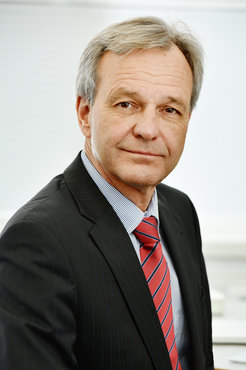Lower Saxony Science Award 2016 goes to Karsten Danzmann
AEI Director honoured as an outstanding scientist at a university in Lower Saxony
Together with 13 other researchers, Prof. Karsten Danzmann, Director of the Institute for Gravitational Physics at Leibniz Universität Hannover and Director at the Max Planck Institute for Gravitational Physics (Albert Einstein Institute, AEI), was honoured as an “outstanding scientist at a university in Lower Saxony” with the 2016 Lower Saxony Science Award.
On the evening of 17 November 2016, the Lower Saxony State Minister of Science and Culture, Gabriele Heinen-Kljajić, conferred the award, which is endowed with a total of 82,500 euros, on Karsten Danzmann and the other winners.

Danzmann was honoured for the key contributions of his research team to the first direct detection of gravitational waves in September 2015. Important core technologies of US LIGO detectors were developed and built at the GEO600 gravitational wave detector near Sarstedt in Lower Saxony. The Scientific Commission of Lower Saxony further substantiated its selection with Danzmann’s participation in the planned LISA (Laser Interferometer Space Antenna) space mission, which will detect low-frequency gravitational waves in space and thus investigate supermassive black holes and cosmological sources. The technologies for LISA are currently being tested in space with the LISA Pathfinder ESA-mission. Danzmann, together with his Italian colleague Stefano Vitale from the University of Trento, is Co-Principal Investigator of this extraordinarily successful mission.
The Scientific Commission also emphasized that, in addition to his tasks as Institute Director, Danzmann continues to carry a full teaching load. Especially in beginner-level lectures, he motivates students early on in their studies, thus recruiting them as enthusiastic junior scientists.
Prof. Danzmann was already honoured this year with the Special Breakthrough Prize in Fundamental Physics and the Gruber Cosmology Prize, for his accomplishments together with the LIGO Scientific Collaboration. He also received the 2016 Lower Saxony State Prize together with Bruce Allen and Alessandra Buonanno.
This year marks the tenth time the annual Lower Saxony Science Award is being awarded. It is intended to “honour prominent individuals who make significant contributions, not only through outstanding performance in research and teaching, but also through their partnerships and networks between universities or non-university partners,” said the Minister in a press release from the German Federal State of Lower Saxony. The award winners were recommended by the universities in Lower Saxony, with the Scientific Commission of Lower Saxony making the selection. The award is endowed with a total of 82,500 euros.












